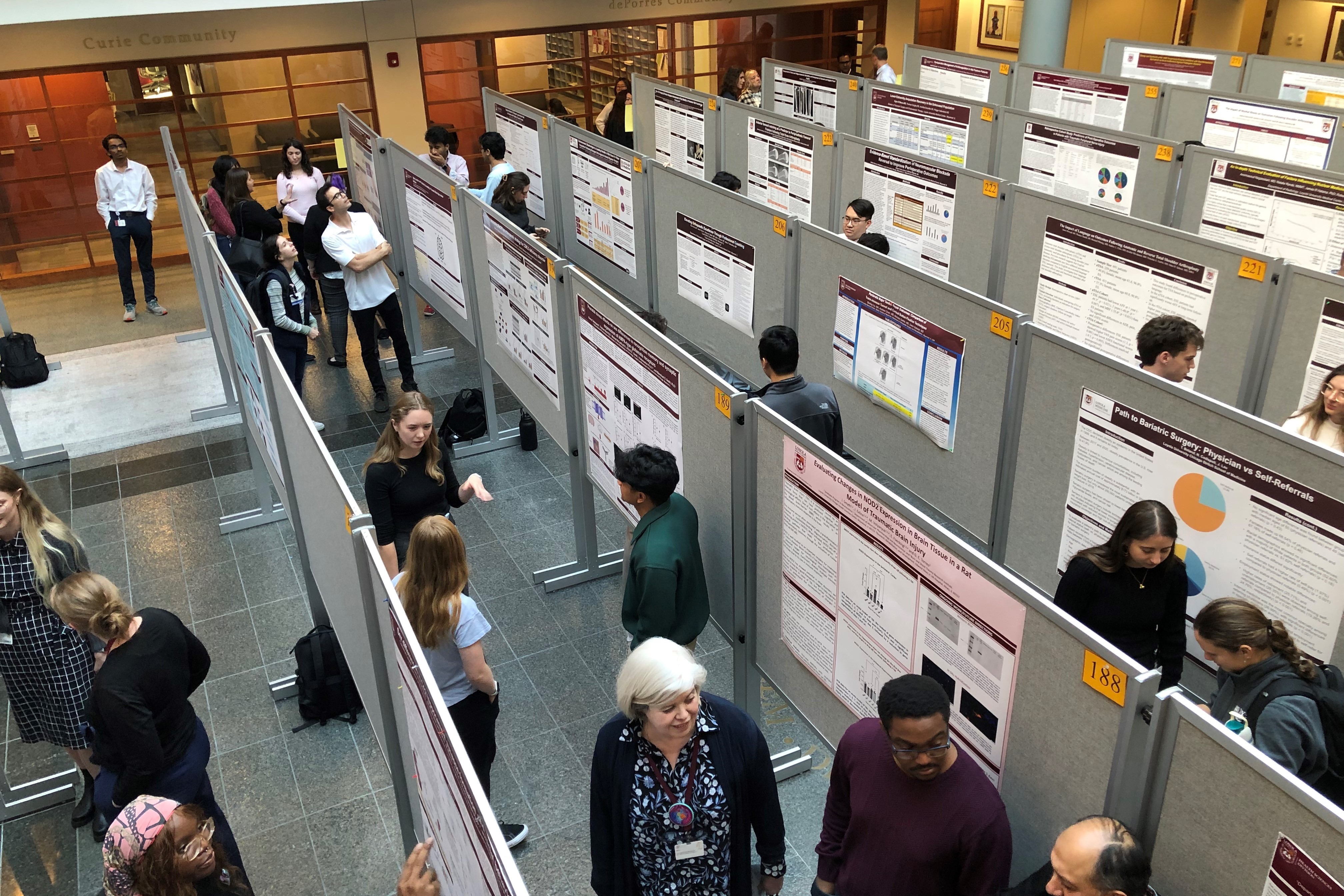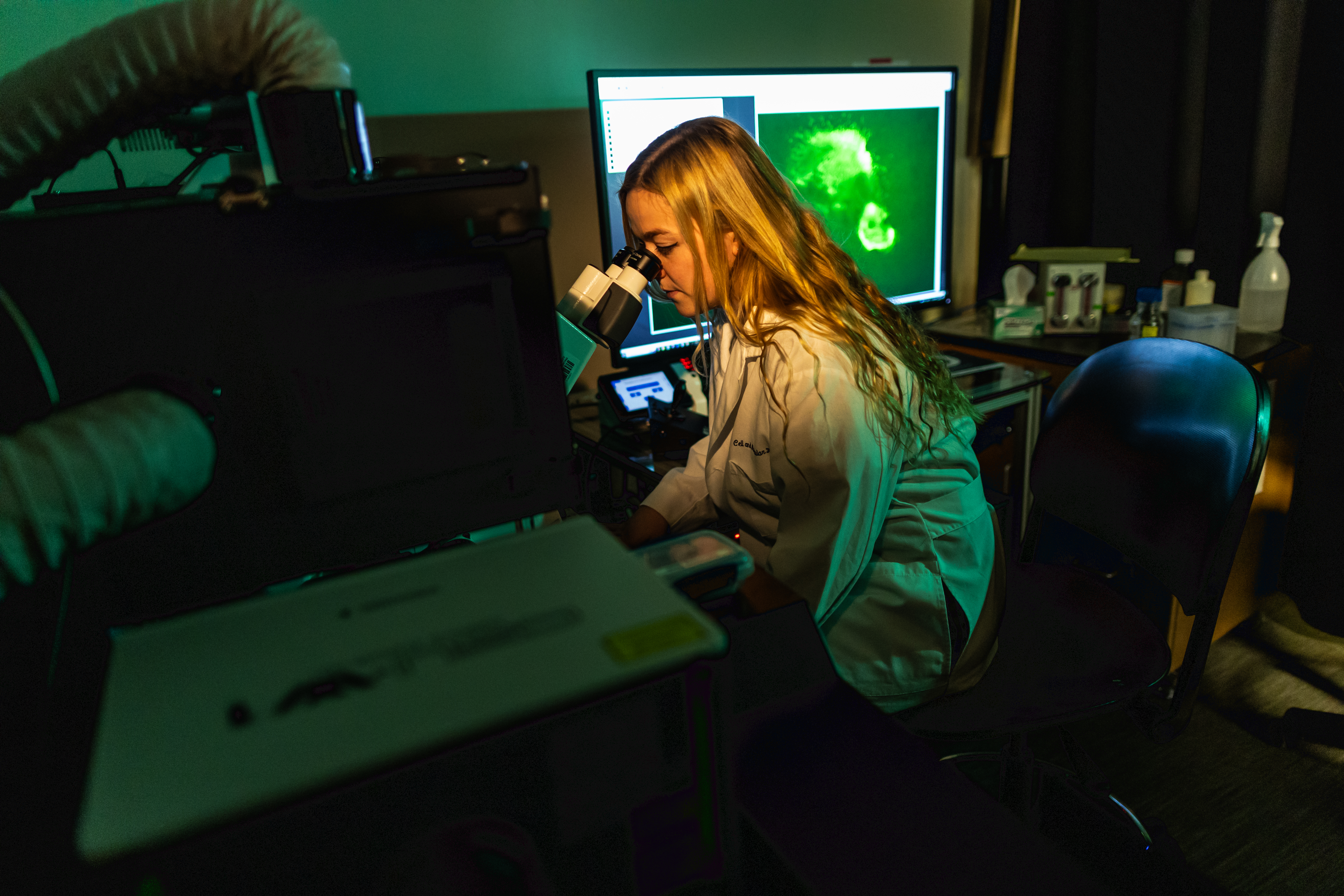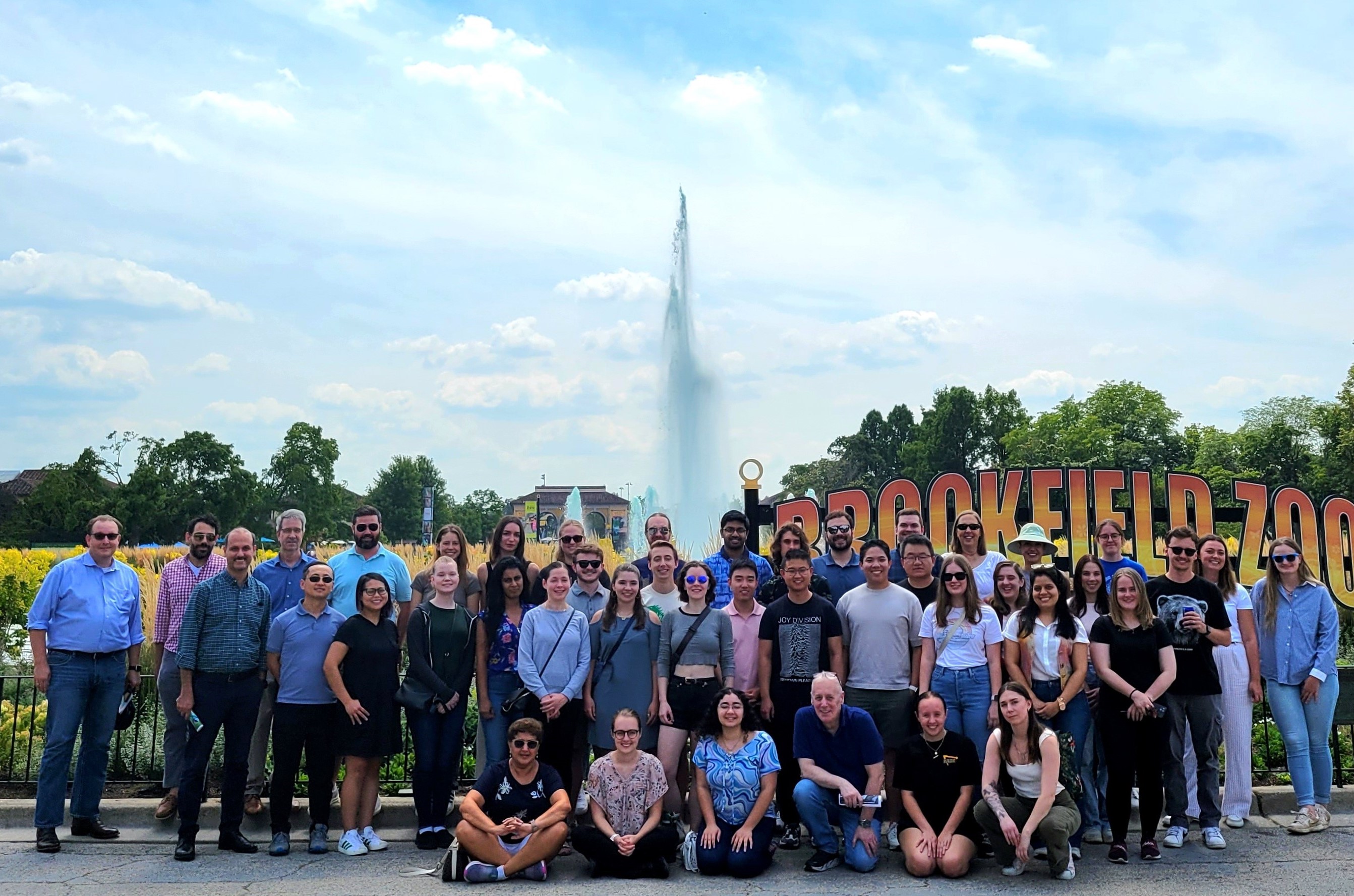
Masters in Cellular and Molecular Oncology
Pursue cancer research alongside Loyola's expert scientists
At Loyola University Chicago, we offer a unique, research-focused program that equips master-level scientists with the skills to pursue potentially life-saving approaches to cancer. With a Master of Science (MS) in Cellular and Molecular Oncology, you will gain hands-on research training in the lab and learn about the many ways to design hypotheses and interpret primary research results. Leading cancer researchers from the Department of Cancer Biology will mentor you and help you achieve success in your research. You also will have the opportunity to support ongoing research in key areas of Oncology at Loyola's Cardinal Bernardin Cancer Center. Our graduates have proven success in pursuing PhD or MD programs or becoming clinical coordinators, research assistants, or senior scientists at pharmaceutical companies.
Our Commitment To You
Graduates of Loyola's Master of Science in Cellular and Molecular Oncology will possess the following knowledge, skills, and professional values to pursue a career in the pharmaceutical, biotech, or biomedical industries.
KNOWLEDGE:
Students develop a solid understanding of cancer risks, development, and therapy. They learn to use molecular, genetic, and pharmacologic tools to answer questions related to cancer initiation, progression, and how the immune system interacts with various cancers.
SKILLS:
Each student will become expert in designing experiments to test hypotheses and aims related to a cancer-focused project. Students also learn how to interact with basic scientists and clinical oncologists.
PROFESSIONAL VALUES:
Students learn and study in an environment that values ethics, collaboration, and honesty.
Curriculum
Our curriculum prepares you to tackle many challenges in cancer research.
In your first semester, you will take courses in basic biomedical sciences and rotate through multiple cancer research labs. These rotations provide you with insights into the department's labs, which focus on:
- Signal transduction and experimental therapeutics
- Tumor immunology and immunotherapy
- Gene regulation and epigenetics
- Stem cell biology
Students must complete a minimum of 30 credits during the two-year MS program. For example: 17 credit hours of required and elective courses and 13 credit hours consisting of research, seminars, and journal clubs. Coursework provides students with training in the biomedical sciences and focused knowledge in oncology. Seminar attendance is required and allows students to learn about oncology research innovations evolving in real time. We encourage Cellular and Molecular Oncology students to participate in journal clubs, which foster collaboration through a student-centered approach.
YEAR ONE: FALL
- BMCS 412 Cell Biology (4 credits)
- BMCS 405 Ethics in Biomedical Sciences (1 credit)
- BMSC 416 Methods in Biomedical Sciences (1 credit)
- CMO 503 Special Topics in Oncology (1 credit)
- CMO 502 Oncology Seminar Series (0 credits)
- CMO 499 Research (2 laboratory rotations; 2 credits)
Total credits: 9
YEAR ONE: SPRING
- MBIO 590 Molecular Biology of Oncogenesis (3 credits)
- CMO 503 Special Topics in Oncology (1 credit)
- CMO 502 Oncology Seminar Series (0 credits)
- CMO 499 Research (2 credits)
- BMSC 402 Statistics for Biomedical Sciences (3 credits)
- Elective (3 credits)
Total credits: 12
YEAR ONE: SUMMER
- Thesis proposal
YEAR TWO: FALL
- CMO 503 Special Topics in Oncology (1 credit)
- CMO 499 Research (7 credits)
- CMO 502 Oncology Seminar Series (0 credits)
- CMO 595 Thesis Supervision (0 credits)
Total credits: 8
YEAR TWO: SPRING
- CMO 503 Special Topics in Oncology (1 credit)
- CMO 502 Oncology Seminar Series (0 credits)
- CMO 595 Thesis Supervision (0 credits)
Total credits: 1
ELECTIVES
- BMB 417 Molecular Biology
- BMB 490 Special Topics: Epigenetics and Stem Cells
- IDIM 400 Infectious and Immunity
- ICB 403 Graduate Histology
- MMIM 471 Molecular Microbial Genetics
- MMIM 502 Special Topics: Pillars in Immunology
- PHAR 408 Receptor & Molecular Pharmacology
- PHAR 409 Principles of Pharmacology
Course Catalog
Admission
Ready to apply? This is a good place to start.
DEADLINES
We accept applications for the MS in Cellular and Molecular Oncology on a rolling basis. Early application is encouraged; we begin evaluating applications in early December. The deadline for all application materials is June 15. Please note: the only documents that cannot be uploaded with an application are transcripts and official test scores. Please email those documents directly to: gradapp@luc.edu. There is no fee to apply.
APPLICATION PROCESS
1. COMPLETED APPLICATION
- Apply online or mail application to:
Graduate and Professional Enrollment Management
Loyola University Chicago
820 N. Michigan Avenue, Suite 1200
Chicago, IL 60611
2. OFFICIAL TRANSCRIPTS
- Applicants should have completed at least a bachelor's degree to apply. Transcripts for all undergraduate and graduate work are required for admission.
3. LETTERS OF RECOMMENDATION
- Applicants must submit three letters of recommendation.
4. STATEMENT OF PURPOSE
- Your statement of purpose should be a brief, one page statement that explains your interest in this program.
5. INTERVIEW
- A virtual interview is required for admission. International applicants can interview by phone or video conference.
INTERNATIONAL APPLICANTS
International applicants must have a degree equivalent to a U.S. Bachelor's degree and are required to submit the above documents as well as:
- TOEFL or IELTS scores
- A Declaration and Certification of Finances Form
- Evaluations of international transcripts sent by any member organization of NACES (National Association of Credential Evaluation Services)
Please visit our International Student Requirements page for more details!
Questions? Contact Student Program Recruiter Patrick Hulseman.
Tuition and Financial Aid
The Biomedical Sciences Graduate Programs and Loyola's Financial Aid Office are committed to helping students secure the financial resources to make their education at Loyola affordable.
Faculty
Students have the opportunity to work closely with faculty-mentors. Read about their research interests.
Nancy Zeleznik-Le, PhD
Chair, Cancer Biology
Professor, Cancer Biology: Medicine
nzelezn@luc.edu CBCC 337
Research Interests: MLL leukemias, Hematopoiesis, Chromatin-mediated gene regulation and epigenetics
Maurizio Bocchetta, PhD
Associate Professor, Cancer Biology, Pathology & Laboratory Medicine
mbocche@luc.edu CBCC 204
Research Interests: OTUD6B deubiquitinase, MYC oncogene, Lung adenocarcinoma
Mitchell F. Denning, PhD
Associate Dean for Graduate Education
Professor, Cancer Biology
Stritch School of Medicine
mdennin@luc.edu CBCC 237
Research Interests: Keratinocyte and melanocyte biology, Ultraviolet radiation induced skin carcinogenesis, Protein kinase C signaling
Sean W. Fanning, PhD
Assistant Professor, Cancer Biology
sfanning@luc.edu CBCC 234
Research Interests: Breast cancer, Nuclear receptors, Drug resistance, Structure-based drug discovery
Kimberly E. Foreman, PhD
Associate Professor, Cancer Biology
kforema@luc.edu CBCC 235
Research Interests: Viral oncology, Medical education, Education outcomes
Irida Kastrati, PhD
Assistant Professor, Cancer Biology
ikastrati@luc.edu CBCC 233
Research Interests: Breast cancer, Selenoproteins, Racial disparity, Therapeutic targets in therapy resistance and recurrence, Drug development
Steven Kregel, PhD
Assistant Professor, Cancer Biology
skregel@luc.edu CBCC 205
Research Interests: Prostate cancer and urologic research, Androgen receptor signaling, Hormone therapies and resistance, Tumor immune microenvironment
Phong T. Le, PhD
Professor, Microbiology & Immunology, Cancer Biology
ple@luc.edu CBCC 304
Research Interests: T-cell development, Thymic epithelial cell biology, Exosomes
Michael Nishimura, PhD
Professor, Surgical Research; Cancer Biology
Associate Director, Cancer Center Translational Research
Program Director, Immunologic Therapeutics
mnishimura@luc.edu CBCC 301
Research Interests: Tumor immunology, Immunotherapy
Clodia Osipo, PhD
Graduate Program Director, Biochemistry, Molecular and Cancer Biology
Associate Professor, Cancer Biology; Microbiology and Immunology
cosipo@luc.edu CBCC 238
Research Interests: Breast cancer, Cancer stem cells, Notch signaling
Wei Qui, PhD
Associate Professor, Cancer Biology; Surgical Research
wqiu@luc.edu CBCC 338
Research Interests: Hepatocellular carcinoma, Tumor cell signaling pathways, Mechanisms of therapeutic resistance in HCC, Alcoholic liver disease
Nan Sethakorn, MD, PhD
Assistant Professor, Hematology/Oncology and Cancer Biology
nan.sethakorn@lumc.edu CBCC 203
Research Interests: Non-small cell lung cancer, Bone metastases, Tumor microenvironment, Resistance to targeted therapies
Derek Wainwright, PhD
Associate Professor, Cancer Biology
Scientific Director, Brain Tumor Research
Program Leader, Cancer Biology and Therapeutics
dwainwright@luc.edu CBCC 202
Research Interests: Glioblastoma, Cancer immunology and immunotherapy, Aging and cancer, Neuroimmunology, Mechanisms of resistance to therapy for cancer
Jiwang Zhang, MD, PhD
Professor, Cancer Biology; Radiation Oncology
jzhang@luc.edu CBCC 336
Research Interests: Hematopoiesis, Stem cell self-renewal, Bone marrow microenvironment, Cell signaling
Outcomes
An MS in Cellular and Molecular Oncology will prepare graduates for a career with Pharma, Biotech., or Biomedical companies/organizations. Graduates will have strong academic and research skills, which can help you become a leading candidate for further study in a PhD or MD program.
News & Events

St. Albert's Day 2024
Salutes student research in the Graduate School, Stritch School of Medicine, Marcella Niehoff School of Nursing and Parkinson School of Public Health.

Super Resolution Microscope
Super-Resolution Microscope acquired by Health Sciences Campus is a game-changer for research in Loyola's Graduate Biomedical Programs.

2024 Biochemistry, Molecular, and Cancer Biology Retreat
The annual Loyola University Chicago Biochemistry, Molecular and Cancer Biology Retreat was recently held at the picturesque Brookfield Zoo.
At Loyola University Chicago, we offer a unique, research-focused program that equips master-level scientists with the skills to pursue potentially life-saving approaches to cancer. With a Master of Science (MS) in Cellular and Molecular Oncology, you will gain hands-on research training in the lab and learn about the many ways to design hypotheses and interpret primary research results. Leading cancer researchers from the Department of Cancer Biology will mentor you and help you achieve success in your research. You also will have the opportunity to support ongoing research in key areas of Oncology at Loyola's Cardinal Bernardin Cancer Center. Our graduates have proven success in pursuing PhD or MD programs or becoming clinical coordinators, research assistants, or senior scientists at pharmaceutical companies.
